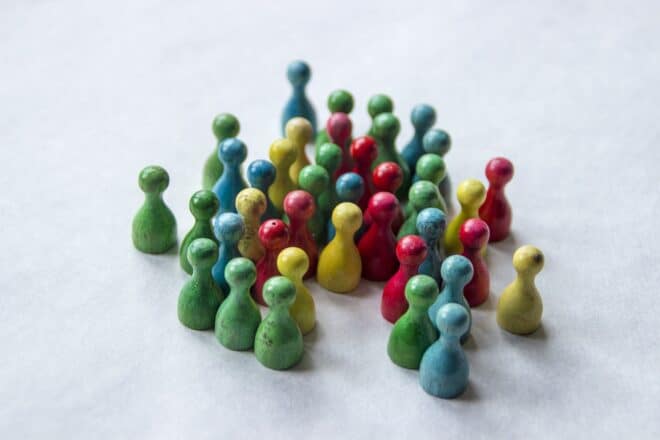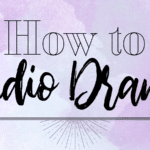Black History Month: Integrated Diversity in Podcasting

Last updated on February 11th, 2021
Okay. Real talk, yall. No matter how much you scream that your podcast production is “diverse,” it does not count if diversity is not seen at every level of production, from your producers and writers, to your voice actors and sound designers.
No need to get salty about it. Try not to get defensive.
Racism is built into our history. America, and much of the world, was built on the backs of Black and Indigenous people. From day one, marginalized identities have been at a disadvantage in the world, thanks to discriminatory laws, income inequality, bias in hiring practices, and occupational segregation. Even now, Black workers are overrepresented in the most underpaid positions. A study conducted by Mercer found that in 2020, Black employees made up about 12% of support staff roles and a measly 2% of executive level positions. Black entrepreneurs and freelancers face greater obstacles than their white counterparts.
Being a majority white field, podcasting cannot and should not follow these trends. You, dear reader, must actively fight to dismantle these power structures. It is not enough to simply hire marginalized people as laborers to voice your works or to edit your audio. You have to do more. Creating a culture of inclusion is hard work. You have to constantly work to be inclusive and make an actual effort to be aware of your own unconscious biases.
Throwing the word “diverse” into your podcast pitch does not mean ticking off a box to ensure that you have that token marginalized identity on your team.
Before we really get into it, I want to take a moment to talk about what “diverse” means. When most folks see the word, the first thought that comes to mind is the amalgamation, word jumble that is LBGTQPOC that often gets tossed in haphazardly to show description. Throwing the word “diverse” into your podcast pitch does not mean ticking off a box to ensure that you have that token marginalized identity on your team.
Diversity means realizing that one person is not diverse but a whole crowd can be. It means variation in backgrounds, values, gender, race, socioeconomic backgrounds. The list goes on and on. Diversity should be seen at every level. It cannot just include the laborers, but the decision makers as well. If the only people making the decisions or writing the story are white and/or cishet and male, I am sorry to say, your podcast is not diverse.
Read more: Over 200 Audio Professionals Sign Anti-Racist Open Letter to Public Media
Inclusion, simply put, just means providing the same resources (like income and opportunities) and support (meaning accessibility and safety measures) to everyone in an equal and fair way. You cannot have diversity without inclusion. Well… you can, but it’s going to be a Bad Time for the marginalized people you recruit.
Inclusion is something you must work towards through policies and through the mere act of listening to the needs of the people you bring on. Most majority-white organizations are not set up to handle the amount of ferocious harassment Black people and other marginalized identities face each day, both online and off. With the panoramdemic keeping everyone at home and unhappy, there seems to be an uptick in the harassment of marginalized creators, especially during this Black History Month.
So, on from the “what” to the “how” of diversity and inclusion.
If you can’t find someone who is not cis/het/white, you are not looking hard enough.
As I mentioned above, it’s really pretty simple to make sure your production is diverse and inclusive: stop searching for candidates in majority white pools, be sure to listen to the needs of those you bring on, and be prepared to defend them when they need it.
Workplace inclusivity cannot happen on its own and should not be the responsibility of the employee to implement these practices. It starts at the top. Producers and managers are responsible for making sure they include a diverse range of voices at every level. If you can’t find someone who is not cis/het/white, you are not looking hard enough.
Avoid casting sites that require people to pay a fee to sign up and audition as many marginalized people don’t always have the money to spare in order to be scene. Take a chance on newer voices, and stop picking the same five white guys for your projects. Be aware of your biases, unconscious or otherwise. No one is perfect, not even you.
Be accountable for employees. Practice emotional intelligence and learn to handle these issues of inclusion and interpersonal relationships judiciously and empathetically. Many podcasts are independently funded, which also means there is not an HR department to do your work for you. You may not always be aware of something that is racist or ableist or sexist, so be sure to listen when others tell you it is. If you are not sure, consider reaching out to a sensitivity consultant of third-party moderator.
Work to create a psychologically safe environment by squashing micro (and macro) aggressions before they happen. Be prepared to admit that you might be wrong and work towards creating a safe environment for the people around you.
We’ve talked about the “what” and the “how,” but I want to take a quick second to discuss the “why.”
Why is diversity important? Why should I bother creating a diverse and inclusive environment for my fellow podcasters? A third rhetorical question about respecting my fellow man regardless of race or gender?
Well, there is value in hiring a more diverse workforce, both morally and, less importantly, financially. On the grounds of morality, Kayla Chadwick put it best: I don’t know how to explain to you that you should care about other people.
Show a little empathy by giving unrepresented identities a voice, a chance. My identity is not inherently political, and giving underheard people the opportunity and resources to finally create and be included is not political. It is a basic human right. Appreciation of underrepresented groups and making them feel included will increase satisfaction and engagement at work, which in turn with decrease employee turnover and increase team performance.
Creating a diverse and inclusive environment is the first step to helping marginalized identities feel connected in this world and to improving your business practices.
Being a good person and putting in the work means people will see you as a good person and find value in working with you. Who knew? On the side of financials, a higher level of gender and racial diversity also means that more innovative ideas which will reach a wider audience, which generally equals higher listener numbers and higher revenue.
Read more: Most De(a)f Representation in Podcasting
Greater employee satisfaction will encourage productivity and collaboration, which can increase your output and production. A study conducted by Josh Bersin/Deloitte in 2015 found that inclusive companies had a higher cash flow per employee and teams were more likely to be able to “coach people for improved performance.” When you outperform in inclusivity, that performance will be reflected in your level of success.
There is still a lot of work to be done, especially in the podcasting industry. Most podcasting networks and creators need to take a chance on those underrepresented voices. Creating a diverse and inclusive environment is the first step to helping marginalized identities feel connected in this world and to improving your business practices. Building these communities require a strong and systematic approach to dismantling racial and gender bias, starting at the very top and integrating it into everything aspect of your world. Doing so means an improvement in your work but in your world as well. There is no better time to start improving life for everyone than right now.













2 Comments
Pingback Black History Month: Liven Up Your Listening Experience With These Podcasts By Black Creators | Discover the Best Podcasts | Discover Pods
Pingback What to Listen to Instead of Reply All | Discover the Best Podcasts | Discover Pods
Comments are closed.